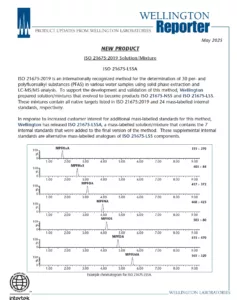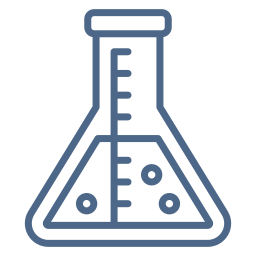ISO 21675:2019 Method
Our solutions for assessing water quality and monitoring persistent pollutantsTo fully support the application of ISO 21675:2019, Wellington has developed solutions and mixtures of native and labelled PFAS, specifically designed for this method.
These mixtures are an essential reference for any environmental monitoring strategy for PFAS.
Home | Wellington Analytical Standards | PFAS | ISO 21675:2019 Analytical Method
Our Solutions/Mixtures developed for the ISO 21675:2019 method
Controlling PFAS analysis requires appropriate, accurate and validated analytical tools. With its ISO 21675-NSS, ISO 21675-LSS andISO 21675-LSSA mixtures, Wellington Laboratories offers a complete solution, directly compatible with the ISO 21675 standard, and suitable for all stages of analysis: from calibration to advanced quantification.
These mixtures are certified standards designed specifically for the application of the ISO 21675:2019 method, used for the analysis of PFAS (per- and polyfluoroalkylated substances) in water.
The combined use of these 3 mixtures ensures that the ISO 21675:2019 method is applied with maximum analytical rigour.
All our CRMs are available in 1.2 mL in methanol and are ISO 9001, ISO/IEC 17025 and ISO 17034 certified.
Native PFAS standards, targeted analytes in ISO 21675 method.
PFAS-labelled standards, targeted analytes in ISO 21675 method.
Complementary mixture for additional analytes.
Our commitments
High precision
These innovative solutions enable reliable identification and quantification of target compounds thanks to their exceptional purity and optimum compatibility with analytical protocols.
Designed to meet the rigorous demands of laboratories, our mixtures offer unrivalled analytical performance, ensuring reproducible results that comply with the most stringent regulatory standards. With Wellington, you benefit from reference tools for carrying out cutting-edge environmental analyses.
Certified reliability
Each batch is accompanied by a detailed certificate of analysis, attesting to the quality and purity of the compounds.
Fast delivery
France and Belgium.
Do you have a question? Contact us using the contact form. We will be delighted to advise you.
ISO 21675-NSS mixture
ISO 21675:2019 Native Stock Solution
Packaging
1.2 mL
Solvent
Methanol
Manufacturer
Wellington Laboratories
Availability & ordering
Contact us
Type of mix
This mixture contains isotopically unlabelled standards of PFAS; analytes targeted in the ISO 21675 method.
Example of application
To establish the calibration curve and quantify the analytes.
List of compounds
*The concentration indicated is reported in salt form.
| Compound | Acronym | Concentration (ng/mL) |
|---|---|---|
| Perfluoro-n-butanoic acid | PFBA | 100 |
| Perfluoro-n-pentanoic acid | PFPeA | 100 |
| Perfluoro-n-hexanoic acid | PFHxA | 100 |
| Perfluoro-n-heptanoic acid | PFHpA | 100 |
| Perfluoro-n-octanoic acid | PFOA | 100 |
| Perfluoro-n-nonanoic acid | PFNA | 100 |
| Perfluoro-n-decanoic acid | PFDA | 100 |
| Perfluoro-n-undecanoic acid | PFUdA | 100 |
| Perfluoro-n-dodecanoic acid | PFDoA | 100 |
| Perfluoro-n-tridecanoic acid | PFTrDA | 100 |
| Perfluoro-n-tetradecanoic acid | PFTeDA | 100 |
| Perfluoro-n-hexadecanoic acid | PFHxDA | 100 |
| Perfluoro-n-octadecanoic acid | PFODA | 100 |
| Perfluoro-1-octanesulfonamide | FOSA | 100 |
| N-Methylperfluoro-1-octanesulfonamide | N-MeFOSA | 100 |
| N-Ethylperfluoro-1-octanesulfonamide | N-EtFOSA | 100 |
| N-Methylperfluoro-1-octanesulfonamidoacetic acid | N-MeFOSAA | 100 |
| N-Ethylperfluoro-1-octanesulfonamidoacetic acid | N-EtFOSAA | 100 |
| 2H-Perfluoro-2-decenoic acid | FOUEA | 100 |
| 2,3,3,3-Tetrafluoro-2-(1,1,2,2,3,3,3-heptafluoropropoxy)propanoic acid | HFPO-DA | 100 |
| Potassium perfluoro-1-butanesulfonate | PFBS | 100* |
| Sodium perfluoro-1-hexanesulfonate | PFHxS | 100* |
| Sodium perfluoro-1-heptanesulfonate | PFHpS | 100* |
| Sodium perfluoro-1-octanesulfonate | PFOS | 100* |
| Sodium perfluoro-1-decanesulfonate | PFDS | 100* |
| Sodium 1H,1H,2H,2H-perfluorooctanesulfonate | 6:2FTS | 100* |
| Sodium 1H,1H,2H,2H-perfluorodecanesulfonate | 8:2FTS | 100* |
| Sodium dodecafluoro-3H-4,8-dioxanonanoate | NaDONA | 100* |
| Potassium 9-chlorohexadecafluoro-3-oxanonane-1-sulfonate | 9Cl-PF3ONS | 100* |
| Sodium bis(1H,1H,2H,2H-perfluorodecyl) phosphate | 8:2diPAP | 100* |
ISO 21675-LSS mixture
ISO 21675:2019 Labelled Stock Solution
Packaging
1.2 mL
Solvent
Methanol
Manufacturer
Wellington Laboratories
Availability & ordering
Contact us
Type of mix
This mixture contains isotopically labelled standards of PFAS, the analytes targeted in the ISO 21675 method.
Example of application
As internal references to correct bias, guaranteeing robust and reliable results.
List of compounds
*The concentration indicated is reported in salt form.
| Compound | Acronym | Concentration (ng/mL) |
|---|---|---|
| Perfluoro-n-(1,2,3,4-13C4)butanoic acid | MPFBA | 100 |
| Perfluoro-n-(1,2,3,4,5-13C5)pentanoic acid | M5PFPeA | 100 |
| Perfluoro-n-(1,2,3,4,6-13C5)hexanoic acid | M5PFHxA | 100 |
| Perfluoro-n-(1,2,3,4-13C4)heptanoic acid | M4PFHpA | 100 |
| Perfluoro-n-(13C8)octanoic acid | M8PFOA | 100 |
| Perfluoro-n-(13C9)nonanoic acid | M9PFNA | 100 |
| Perfluoro-n-(1,2,3,4,5,6-13C6)decanoic acid | M6PFDA | 100 |
| Perfluoro-n-(1,2,3,4,5,6,7-13C7)undecanoic acid | M7PFUdA | 100 |
| Perfluoro-n-(1,2-13C2)dodecanoic acid | MPFDoA | 100 |
| Perfluoro-n-(1,2-13C2)tetradecanoic acid | M2PFTeDA | 100 |
| Perfluoro-n-(1,2-13C2)hexadecanoic acid | M2PFHxDA | 100 |
| Perfluoro-1-(13C8)octanesulfonamide | M8FOSA | 100 |
| N-methyl-d3-perfluoro-1-octanesulfonamide | d-N-MeFOSA | 100 |
| N-ethyl-d5-perfluoro-1-octanesulfonamide | d-N-EtFOSA | 100 |
| N-methyl-d3-perfluoro-1-octanesulfonamidoacetic acid | d3-N-MeFOSAA | 100 |
| N-ethyl-d5-perfluoro-1-octanesulfonamidoacetic acid | d5-N-EtFOSAA | 100 |
| 2H-Perfluoro-(1,2-13C2)-2-decenoic acid (8:2) | MFOUEA | 100 |
| 2,3,3,3-Tetrafluoro-2-(1,1,2,2,3,3,3-heptafluoropropoxy)(13C3)propanoic acid | M3HFPO-DA | 100 |
| Sodium perfluoro-1-(2,3,4-13C3)butanesulfonate | M3PFBS | 100* |
| Sodium perfluoro-1-(1,2,3-13C3)hexanesulfonate | M3PFHxS | 100* |
| Sodium perfluoro-(13C8)octanesulfonate | M8PFOS | 100* |
| Sodium 1H,1H,2H,2H-perfluoro(1,2-13C2)octanesulfonate (6:2) | M2-6:2FTS | 100* |
| Sodium 1H,1H,2H,2H-perfluoro(1,2-13C2)decanesulfonate (8:2) | M2-8:2FTS | 100* |
| Sodium bis[1H,1H,2H,2H-(1,2-13C2)perfluorodecyl] phosphate | M4-8:2diPAP | 100* |
ISO 21675-LSSA mixture
ISO 21675:2019 Labelled Stock Solution Additional Analytes

Packaging
1.2 mL
Solvent
Methanol
Manufacturer
Wellington Laboratories
Availability & ordering
Contact us
Type of mix
With the ISO 21675-LSSA mixture, Wellington Laboratories provides a targeted response to the needs of analysts faced with the increasing complexity of PFAS in the environment. Added to the main LSS mixture, this solution broadens the spectrum of measurable compounds, while maintaining the rigorous analytical standards imposed by ISO 21675.
List of compounds
*The concentration indicated is reported in salt form.
Do you have a question? Contact us using the contact form. We will be delighted to advise you.

PFAS, per- polyfluoroalkyl Substances

Halogenated flame retardants, HFRs and other compounds

Polychlorinated biphenyls, PCBs

Polybrominated diphenyl ethers, PBDEs Polybrominated biphenyls, PBBs

Dioxins, Furans, PCDDs, PCDFs

Organochlorine Pesticides, OCP

Certified reference materials

Other reagents
Find out more about the ISO 21675 standard
ISO 21675:2019 specifies a method for the determination of per- and polyfluoroalkylated substances (PFAS) in water, including drinking water, groundwater and surface water. It uses liquid chromatography coupled to tandem mass spectrometry (LC-MS/MS) to detect and quantify these contaminants. This method is essential for assessing water quality and monitoring persistent pollutants.
Do you need laboratory equipment and/or consumables?
Feel free to contact us at any time.
